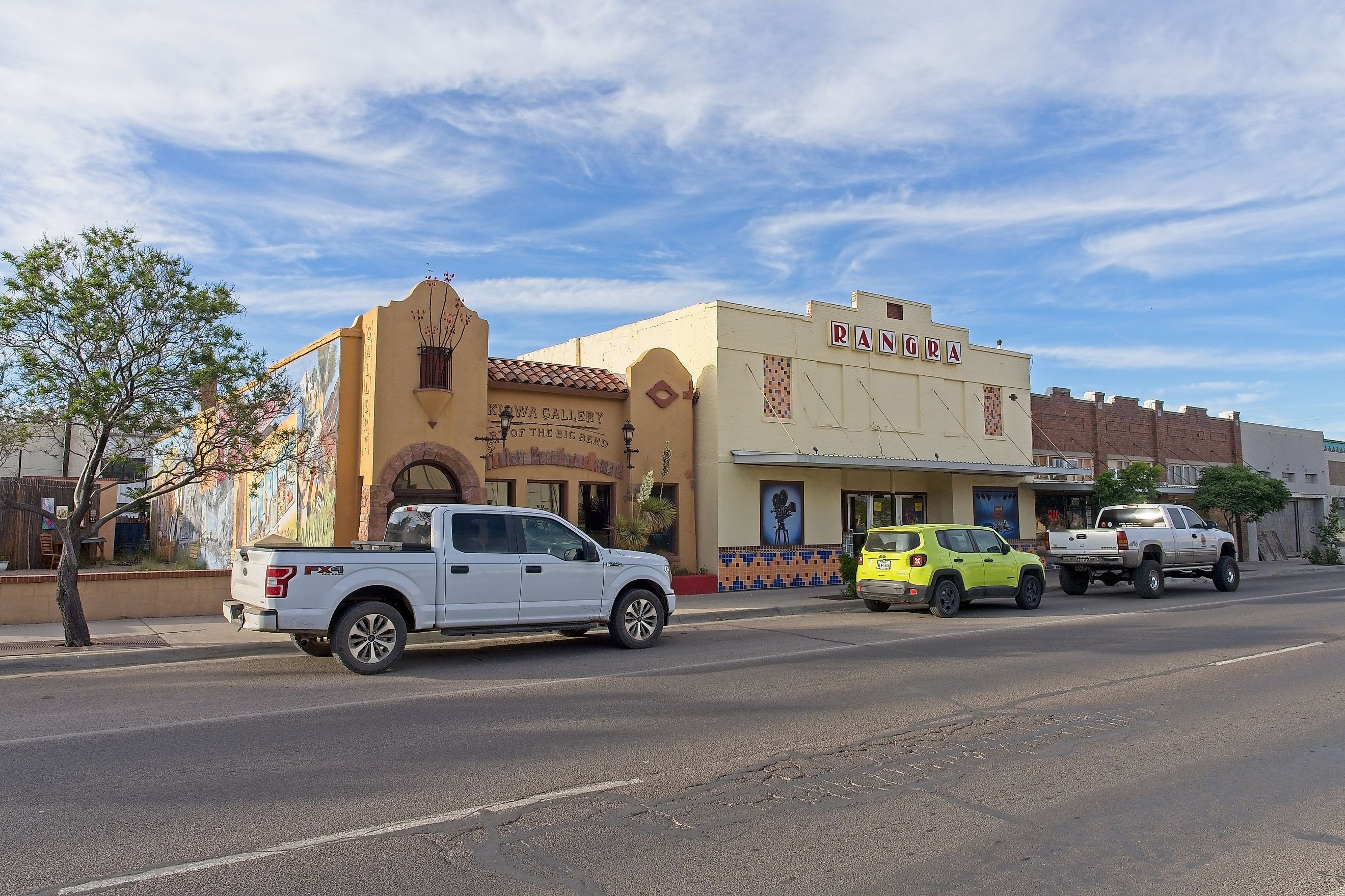
11 Most Scenic Small Towns in Texas
Texas, the second-largest state in the United States, spans over 268,000 square miles and is known for its diverse landscapes, including deserts, forests, and coastline along the Gulf of Mexico. With a population exceeding 29 million, Texas boasts a robust economy driven by industries such as energy, agriculture, technology, and tourism. The state is also rich in cultural heritage, influenced by a blend of Native American, Mexican, and Western traditions.
Texas is home to picturesque small towns with historic architecture and abundant natural beauty, including rolling hills, rivers, and state parks. These eleven top the list for the most scenic.
Alpine
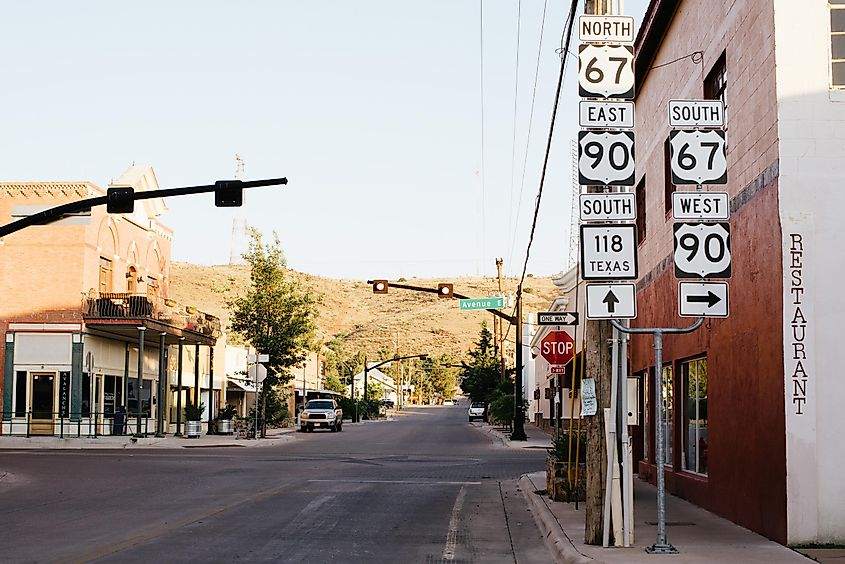
Alpine, nestled in the heart of West Texas, is a small town established in the late 19th century. Alpine grew as a pivotal stop on the Southern Pacific Railroad, facilitating trade and travel in the region. The town's location in the high desert of the Big Bend region makes it a gateway to outdoor adventures, including those in the nearby Big Bend National Park and the Davis Mountains.
The Museum of the Big Bend has exhibits on the history and culture of the Big Bend region. Visitors can explore artifacts and stories that highlight the area's diverse heritage. Kokernot Field is a historic baseball field with unique stone architecture. It hosts local baseball games and provides a glimpse into the town's sporting history. Cathedral Mountain has hiking opportunities with vistas. The trails lead to views of the surrounding landscape.
Fredericksburg

Fredericksburg, located in the Texas Hill Country, was founded in 1846 by German immigrants and is known for its well-preserved German heritage. The town's founders, led by John O. Meusebach, established a peaceful coexistence with the local Comanche tribes through the Meusebach-Comanche Treaty. This cultural heritage is evident in the town's architecture, cuisine, and numerous festivals celebrating its German roots.
The National Museum of the Pacific War is dedicated to the Pacific Theater of World War II. The museum features exhibits and artifacts that tell the story of the war's impact on the Pacific region. Enchanted Rock State Natural Area has hiking, rock climbing, and panoramic views. The pink granite dome is a photo opportunity for visitors. Wildseed Farms is the largest working wildflower farm in the United States. Visitors can stroll through fields of blooming wildflowers and purchase seeds and plants.
Luckenbach
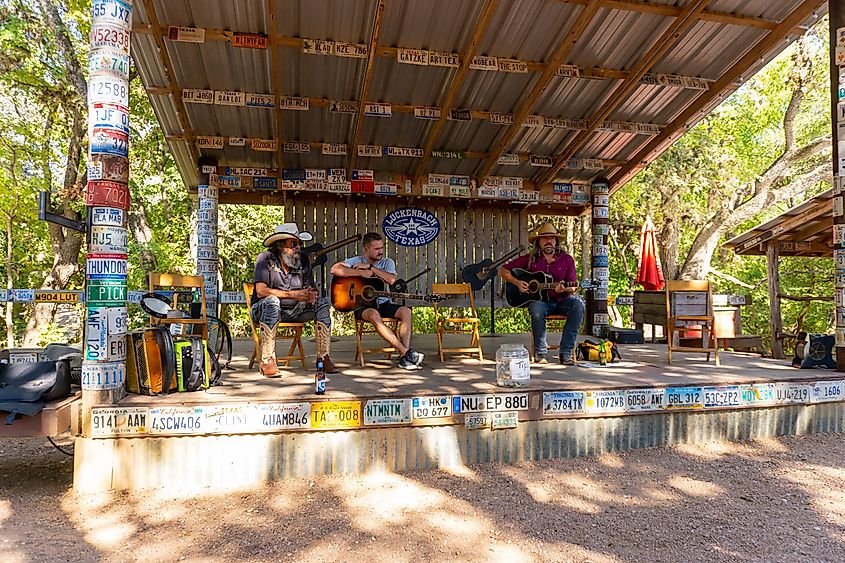
Luckenbach, a tiny unincorporated community in the Texas Hill Country, was established in the mid-19th century by German immigrants. Luckenbach remained a quiet settlement until it gained national fame in the 1970s. This fame was due in large part to country music legends like Willie Nelson and Waylon Jennings, who popularized the town in their songs. The town's motto, "Everybody's Somebody in Luckenbach," reflects its spirit.
Luckenbach Dance Hall is a historic dance hall known for its country music performances. It hosts live music events and dances, attracting visitors from all over. Luckenbach Texas General Store is a historic store offering souvenirs and local products. The store also serves as a gathering place for locals and tourists alike. Becker Vineyards is known for its winery and lavender fields. The vineyard has wine tastings and tours of its scenic grounds.
Wimberley

Wimberley, also in the Texas Hill Country, is a town founded in the 1850s as a trading post and milling center. Wimberley has grown into a destination for those seeking a peaceful retreat and outdoor recreation. The town is located along Cypress Creek and the Blanco River. The town has become a hub for artists and musicians.
Jacob's Well Natural Area is an artesian spring with opportunities for swimming and hiking. The clear waters make it a favorite spot for visitors. Blue Hole Regional Park is known for its clear blue swimming hole and nature trails. The park provides a refreshing escape during the hot summer months. Wimberley Glassworks has glassblowing demonstrations and unique glass art. Visitors can watch artisans at work and purchase one-of-a-kind pieces.
Castroville
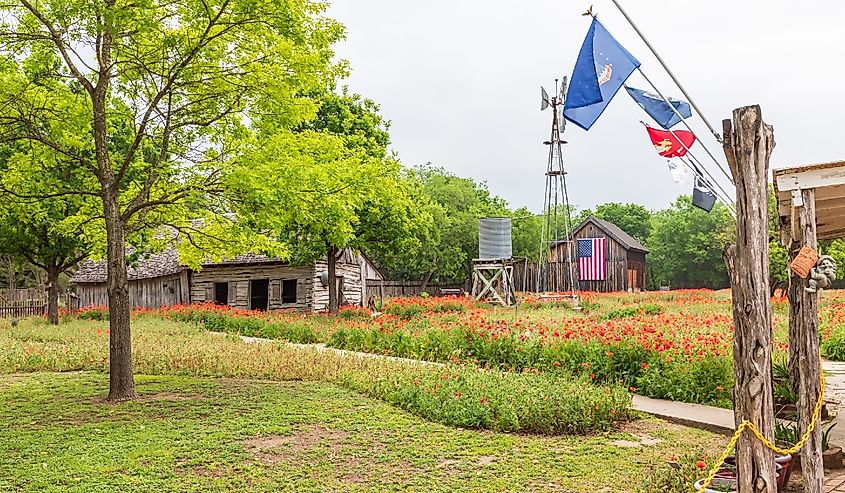
Castroville, often referred to as "The Little Alsace of Texas," was founded in 1844 by Henri Castro, a French impresario. Located along the Medina River, Castroville is known for its Alsatian heritage. The town's early settlers were primarily Alsatian immigrants, and their influence is still evident today. Castroville's historic district is home to many well-preserved 19th-century buildings.
Steinbach House is a historic Alsatian house relocated from France. It now is a museum showcasing Alsatian culture and history. Castroville Regional Park is for hiking, swimming, and picnicking along the Medina River. The park is a spot for relaxation. St. Louis Catholic Church is a historic church known for its architecture. It is a testament to the town's cultural and religious heritage.
Nacogdoches
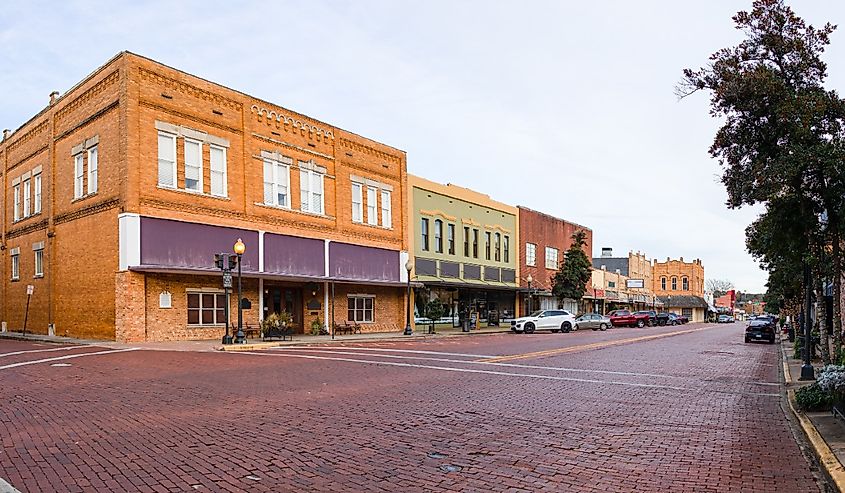
Nacogdoches, the oldest town in Texas, was established in 1779 by Spanish settlers. Located in East Texas, it played a role in the state's early history, including the Texas Revolution. Nacogdoches is known for its historic downtown, gardens, and university community. The town is home to Stephen F. Austin State University, which contributes to its cultural scene.
Millard's Crossing Historic Village is a collection of historic buildings and artifacts. Visitors can explore 19th-century structures and learn about the region's history. SFA Mast Arboretum is a botanical garden with diverse plant species and scenic trails. It is a setting for walking and nature study. Nacogdoches Sterne-Hoya Museum and Library is a house museum with exhibits on local history. The museum looks at the lives of early settlers and the development of the town.
Boerne

Boerne, located in the Texas Hill Country, was founded in 1849 by German immigrants. The town's history is deeply intertwined with its German roots, and many of its historic buildings reflect this heritage. Boerne is also known for its festivals and community events, which celebrate its culture.
Cave Without a Name is a natural cave with guided tours and formations. The cave's intricate formations are a must-see for visitors. Agricultural Heritage Museum showcases the agricultural history of the region. The museum has exhibits on farming, ranching, and rural life. Kreutzberg Canyon Natural Area has hiking trails and views of the Guadalupe River. The area is for outdoor enthusiasts and nature lovers.
Palestine
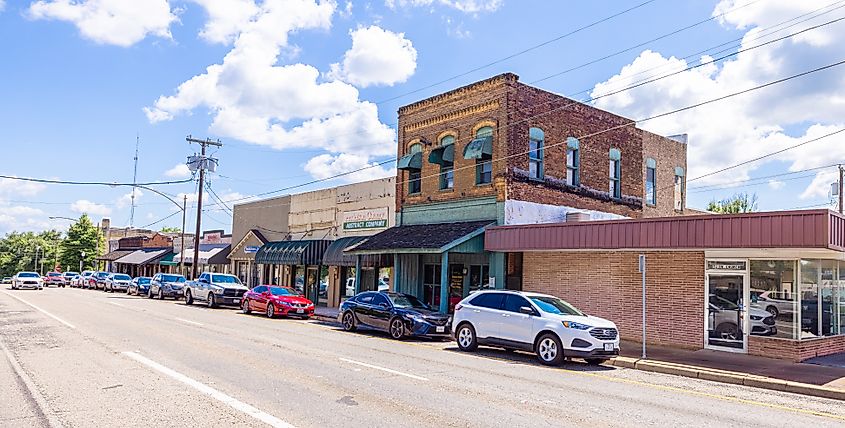
Palestine, located in East Texas, was established in 1846 and grew as a railroad hub. The town's history includes its role in the timber and oil industries. Today, Palestine is known for its architecture, cultural attractions, and parks. The town's historic district features well-preserved homes and buildings from the Victorian Era—a glimpse into its past. Palestine's location in the Piney Woods region also makes it a nature-rich destination.
Texas State Railroad has train rides through the East Texas Piney Woods. The historic trains are a nostalgic experience for visitors. Davey Dogwood Park is known for its dogwood trees and nature trails. The park is especially popular during the annual Dogwood Trails Festival. The Museum for East Texas Culture is housed in a historic school building with exhibits on local history.
Llano

Llano, located in the center of the Texas Hill Country, was established in 1856 and became an important center for ranching and mining. The town's setting along the Llano River and its historic downtown make it a scenic destination. Llano's history is marked by its early days as a mining town and its subsequent growth as a ranching community.
Llano County Historical Museum provides insights into the town's past and its development. Inks Lake State Park has camping, hiking, and water activities. The park's lake and trails are popular with visitors. Longhorn Cavern State Park is known for its underground formations and guided tours. The park is a unique geological experience for visitors.
Brenham

Brenham, located in Washington County, is known as the "Birthplace of Texas." Founded in 1844, the town played a key role in the Texas Revolution and the early days of the Republic of Texas. Brenham is also famous for its bluebonnets and Blue Bell Ice Cream.
Blue Bell Creameries has tours and tastings at the ice cream factory. Visitors can learn about the ice cream-making process and enjoy samples. Antique Rose Emporium is home to roses and gardens. The gardens are ideal for walking and photography. Washington-on-the-Brazos State Historic Site is specifically known as the birthplace of Texas. The site includes a museum, historic buildings, and educational exhibits.
Chappell Hill
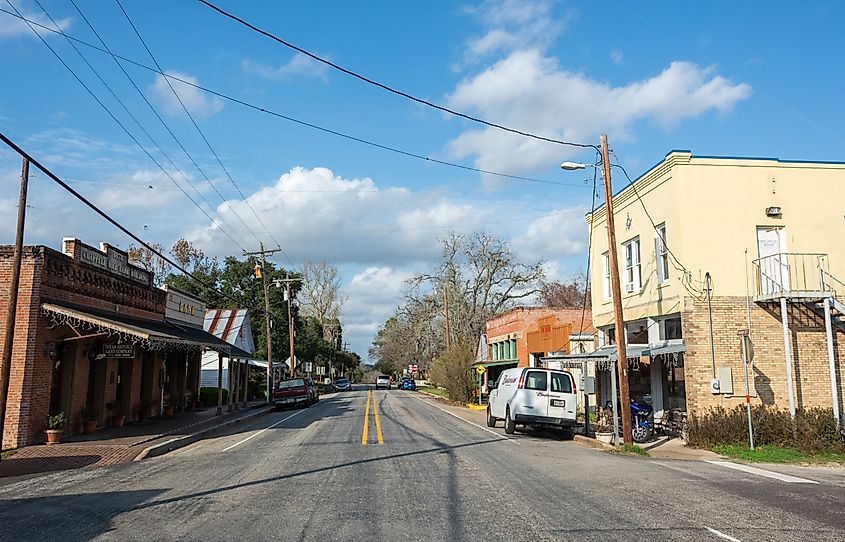
Chappell Hill, also located in Washington County, was founded in 1847 by Mary Hargrove Haller. The town became an important center for cotton farming and trade. Chappell Hill's buildings and annual festivals reflect its cultural heritage.
The Chappell Hill Historical Society Museum has exhibits on local history and culture. The museum provides a glimpse into the town's past and its development. Chappell Hill Lavender Farm offers tours and a chance to pick your own lavender. The farm is a popular destination for visitors seeking a unique agricultural experience. Texas Cotton Gin Museum features exhibits on the history of cotton farming in Texas. The museum showcases the importance of cotton to the region's economy.
In Summary
The towns highlighted in this article showcase the scenic beauty of Texas. Alpine is a gateway to outdoor adventures in the Big Bend region, while Fredericksburg preserves its German heritage and wine culture. In contrast, the music-filled streets of Luckenbach capture the spirit of Texas Hill Country. Each of these eleven towns has character and historical significance that makes them worthy of a visit for those seeking to explore the smaller, more scenic side of Texas.











